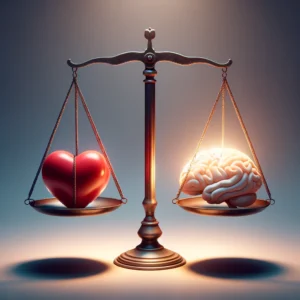You want to find love, but something is holding you back. It’s not your looks, your personality, or your luck. It’s your mind.
Yes, your mind is playing tricks on you, making you believe things that are not true, and preventing you from finding the right person for you.
These are called psychological biases, and they are more common than you think. In fact, six major ones keep people single, and they are not easy to spot or overcome.
But don’t worry, this guide will show you how to identify and overcome these biases and help you find the love you deserve.
1. Focusing Effect Bias
![]()
Also known as the primacy effect, the focusing effect bias refers to placing too much importance on early information when making judgments about people. For example, if you have an incredible first date, you may assume that the person is perfect and your future soulmate. On the other hand, if you feel awkward at first, you may prematurely dismiss the possibility of a connection.
How It Keeps You Single
The focusing effect bias encourages snap judgments based on limited data. When we overly focus on first impressions, we ignore information that emerges later that might change our opinion. This results in false assumptions about compatibility.
Many potentially great relationships do not get a fair chance because of the focusing effect. Chemistry and comfort can take time to develop, but this cognitive blindspot causes us to be overly reactive to initial interactions.
Tips to Overcome It
- Look for trends, not single events – Rather than basing decisions on one great/bad date or interaction, look at patterns over time. Our first impressions are often wrong.
- Remain open-minded in early stages – Avoid making premature judgments. Leave space for people to relax and be themselves rather than pressure them to be “perfect.”
- Reflect on past dating errors – Have you made mistakes because of focusing too much on first impressions? Learn from these experiences.
2. Choice-Supportive Bias

Also known as post-purchase rationalization, choice-supportive bias leads us to retroactively justify our decisions by overlooking negatives and amplifying positives. Essentially, we fool ourselves into believing we made the right choice.
How It Keeps You Single
In dating, this bias causes people to stay in bad relationships. By rationalizing away red flags and incompatibilities, they convince themselves that the relationship is better than it is. “He’s rude to waiters but he does the dishes” or “She doesn’t share my values but the sex is great.”
Choice-supportive bias also makes people reluctant to leave relationships because they don’t want to admit they were wrong. People think “I already put in so much time with this person” or “My family likes them so they must be good.”
Tips to Overcome It
- Track objective relationship data – Rather than using subjective impressions, track factual data on happiness, fights, etc. This avoids rationalizations.
- Listen to trusted friends/family – They are less biased and can spot red flags you miss. If there is a consensus concern, take it seriously.
- Reflect on past dating errors – Have you justified bad relationships before? Learn from these lapses in judgment.
- Imagine advising a friend – If a friend was in your situation, what advice would you give? Remove your own bias.
3. Sexual Overperception Bias

This bias causes men to overperceive sexual interest and cues from women who are just being friendly or polite. On the flip side, women tend to underperceive genuine interest from men.
How It Keeps You Single
For men, sexual overperception leads to misinterpreting friendliness as sexual interest. This results in unwelcome advances and harassment in severe cases. Understandably, being perceived this way makes women distrusting.
For women, underperceiving interest can cause missing opportunities with great potential partners. Misinterpreting politeness as a lack of attraction results in premature rejection.
Tips to Overcome It
- Use direct communication – Don’t rely on signals. Politely communicate your interest and ask for clarity if you are unsure.
- Check your assumptions – Ask yourself “Am I projecting my own feelings/agenda onto this situation?” Seek objective feedback.
- Empathize with the other perspective – Men: Consider how women want to be treated in social situations. Women: Understand men may need clear affirmation.
- Look for consistency – Interest is shown consistently through actions over time, not just isolated moments that can be misconstrued.
4. Confirmation Bias
Confirmation bias causes us to seek and interpret information in a way that confirms our preexisting beliefs or ideas about a person. We tend to ignore evidence that contradicts our perspective.
How It Keeps You Single
In dating, confirmation bias can lead to self-fulfilling prophecies. If you believe men only want sex, you will notice more evidence to confirm this. If you are convinced someone is your soulmate, you ignore red flags.
This mental blindspot causes people to hold onto false beliefs about dating that sabotage their success. For example, women may believe “all the good men are taken” or men may think “women only want rich guys.”
Tips to Overcome It
- Consider contradictory evidence – Actively look for examples that contradict your biases. Seek out balanced perspectives.
- Question your assumptions – Ask yourself “What if my beliefs about dating/this person are incorrect?” Entertain different possibilities.
- Keep an open mind – Don’t make snap judgments about people or prematurely categorize them. Remain objective.
- Watch for pattern recognition errors – Our brains try to classify information. Be wary of thought patterns like “Here we go again” as these encourage bias.
5. Stereotyping

Stereotyping refers to making generalized beliefs about groups of people based on limited experiences or societal bias. Common examples of dating include stereotypes based on ethnicity, gender, profession, education, etc.
How It Keeps You Single
Stereotyping results in unfair judgments of individuals based on the actions of groups. When dating, this causes people to make snap decisions based on surface traits versus taking the time to truly know someone.
It also leads to unrealistic and contradictory expectations. Women get labeled as either too career-focused or not ambitious enough. Men are categorized as unwilling to commit or too needy.
Tips to Overcome It
- Look for uniqueness – Get to know people as individuals. See their complexity and uniqueness rather than trying to fit them into narrow categories.
- Question your assumptions – Be aware of societal biases and question where your beliefs about groups come from. Dig deeper.
- Check for hypocrisy – Are you judging people for qualities you don’t actually care about or even possess yourself? Be real.
- Listen to understand – Ask genuine questions. Seek to truly understand someone’s story rather than rely on stereotypes.
6. Hindsight Bias
Hindsight bias refers to believing after the fact that we knew the outcome all along. Essentially, it is selective memory that creates an illusion of predictability.
How It Keeps You Single
In dating, hindsight bias can lead to false certainty about why a relationship failed. You convince yourself “I knew he was wrong since our third date” when that insight only came after the breakup.
This bias causes people to ignore issues while in a relationship because the problems seem predictable in hindsight. People fall into the same patterns over and over.
Tips to Overcome It
- Review objectively – When reflecting on past relationships, reference tangible data like your feelings logged in a journal rather than memories.
- Watch for overconfidence – Be cautious of thoughts like “I knew it!” after a breakup. It is usually a bias distorting the truth.
- Consider alternative outcomes – How else could the relationship have played out? Contemplate different possibilities to combat feeling the outcome was inevitable.
- Focus on the present – Don’t get stuck overanalyzing the past. Stay focused on getting to know new people without biased expectations.
In Summary
Our minds love to play tricks on us, especially when it comes to something as complex as finding love. By becoming aware of psychological biases like the focusing effect, choice-supportive bias, stereotyping, and more, we can avoid self-deception in dating.
The key is catching ourselves when we are rationalizing, generalizing, or remembering things inaccurately. With mindful self-awareness, we can overcome these mental pitfalls.
Of course, biases are not the only things keeping people single. Finding the right partner also requires putting yourself out there, learning relationship skills, healing from past hurts, and maintaining realistic expectations. However, by recognizing how psychology impedes us, we can remove significant obstacles on our path to love.
Here are some final tips for avoiding biases and improving your dating mindset:
- Stay objective and fact-focused when evaluating partners – track actual data on compatibility rather than relying on subjective impressions.
- Listen to trusted friends/family when they point out red flags – don’t just rationalize everything away.
- Communicate directly about your interest level to avoid misinterpreting signals.
- Keep an open mind about people rather than pigeon-holing them into stereotypes.
- Reflect on past dating errors to identify patterns of biased thinking.
- Imagine how you would advise a friend in your situation to remove your own bias.
- Focus on getting to know people’s uniqueness rather than trying to fit them into categories.
The path to love requires wisdom, self-awareness, and a willingness to challenge our own assumptions. By recognizing how psychology can trip us up, we gain an advantage in finding fulfilling relationships. With the right mindset, plus perseverance and luck, you can overcome the barriers holding you back from the love you deserve.

